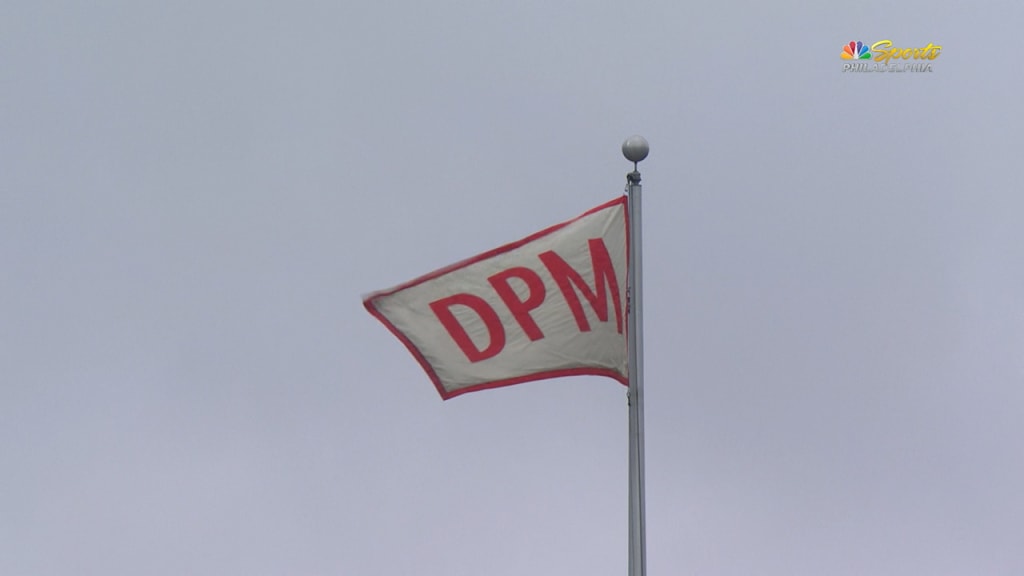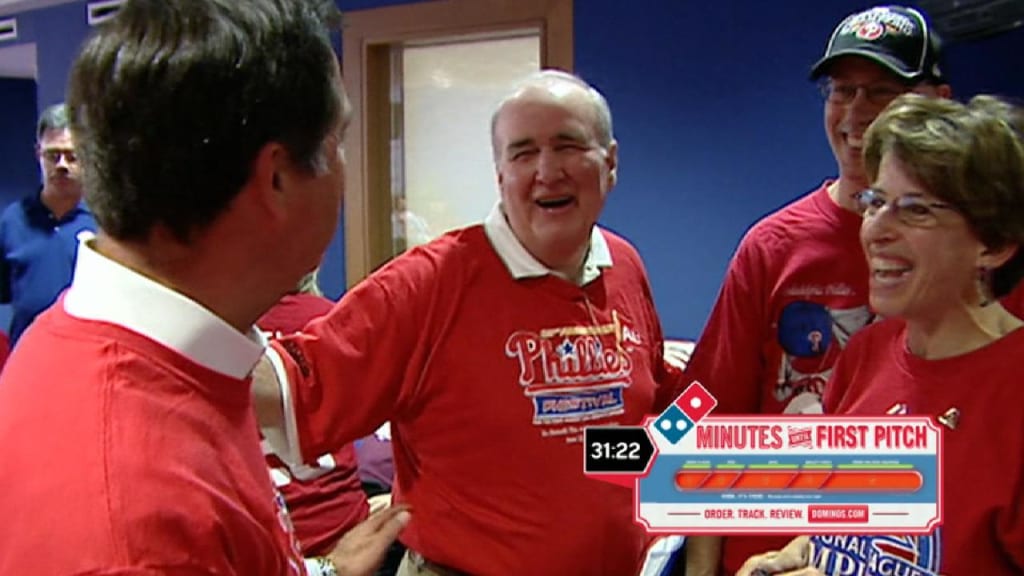The David Montgomery story: Revered by all
This browser does not support the video element.
There are homegrown stars in baseball, and then there is David Montgomery. And while executives aren’t often described by numbers, here are two that help to place his career in context.
Forty-eight years in the game.
One employer.
Montgomery grew up in the Roxborough neighborhood of Philadelphia and began working in the Phillies ticket office as the franchise moved to Veterans Stadium. At the time of his passing in May 2019, Montgomery was the team’s chairman and part owner.
Montgomery’s loyalty and compassion while leading a World Series-winning organization will be celebrated in Cooperstown, through his recognition as the John Jordan “Buck” O’Neil Lifetime Achievement Award recipient for 2020. Following the postponement of last year’s ceremony, Montgomery will be honored this weekend in the Baseball Hall of Fame Awards Presentation, a television-only event broadcast on MLB Network.
• Montgomery honored with Buck O'Neil Award
In February, I received an email from Marc Caiafa, our senior vice president of production at MLB Network. He asked if I would write the script for a video essay about Montgomery’s life and career, to air as part of our awards presentation coverage. Absolutely, I replied.
I was familiar with the great esteem Montgomery enjoyed among fellow baseball owners and executives. Beyond that, I had some research to do. Because of the magnitude of the O’Neil Award and Montgomery’s contributions to the sport, I wanted to speak with two or three people who really knew him before I could confidently begin the writing process.
This browser does not support the video element.
Bonnie Clark, the Phillies’ vice president of communications, was my first contact. I explained my assignment and how I planned to approach the essay. I was hoping for some guidance and background information, maybe a phone number or two.
I wasn’t prepared for her answer.
“I can’t give you two names,” she told me, “because there are so many people who will want to talk with you about David.”
Bonnie provided me with a half-dozen names, and the conversations began -- unified in theme and unique in content. Everyone who worked for the Phillies over the last half-century, it seems, has a great David Montgomery story. Usually, they have more than one.
My phone calls followed a familiar format: I’d dial someone whom Bonnie had recommended to me. I’d say that I was hoping to hear a story or two about David Montgomery. The person would pause, allowing the emotions and memories to settle for a moment. Then the anecdotes would begin.
I asked very few follow-up questions. The mention of Montgomery’s name was sufficient.
“He was so focused on making sure everyone around him felt special,” Bonnie told me. “I was in awe of the amount of knowledge he’d absorb about people, whether they were an intern, a spectator, or part of the ballpark staff. He didn’t just learn names. He wanted to know what they did. He remembered the names of employees’ children and asked how they were doing.
“He also had this gift for being in about 12 places at once. He would go to six events in one day, then come back for a home game. He understood how important those community relationships are to the Phillies as a whole. I don’t know how the man did it. And the only time I ever saw him lose his cool was when we had rain delays — because of the inconvenience to fans, not the business.”
This browser does not support the video element.
Montgomery understood a fan’s point of view, because he never forgot that part of his identity. He grew up attending sporting events at Connie Mack Stadium, Franklin Field and the Palestra. Montgomery earned his big break in baseball through his role as an assistant football coach on the high school team that included the son of Baseball Hall of Famer Robin Roberts. Montgomery made it known that he wanted to work for the Phillies; Roberts helped him secure a meeting with team executive Bill Giles.
• Complete Hall of Fame coverage
Before long, Montgomery had his first assignment, tasked with calling fans in an effort to convince them to keep their season tickets at brand-new Veterans Stadium. Montgomery’s responsibilities and job titles evolved over time. By 1981, he joined Giles in the team’s ownership group.
Richard Deats, Montgomery’s best friend since childhood, said Montgomery’s ascent provided him the perspective of every role in the organization.
“He had empathy for the people doing those jobs, because he had been there,” said Deats, the Phillies’ former vice president of ticket sales. “It would have been hard for someone to say to him, ‘You don’t understand my job,’ because he did. He knew the inner workings of the organization from top to bottom.”
This browser does not support the video element.
Hall of Famer Pat Gillick described Montgomery as “one of the most caring, supportive, loyal people I’ve met in 80-plus years.”
After the 2005 season, Gillick had two offers to become a GM: one from the Dodgers and one from the Phillies. Initially, Gillick was inclined to take the job in Los Angeles. Gillick is a California native and University of Southern California graduate; he was living on the West Coast at the time, following his tenure as GM of the Seattle Mariners.
But Gillick chose the Phillies instead, after one four-hour meeting with Montgomery at the Philadelphia Airport Marriott. The deciding factors included Montgomery’s abiding love for the game and the supportive culture he’d created within the organization.
Less than three years after Gillick made that decision, the Phillies were World Series champions. While accepting the Commissioner’s Trophy at Citizens Bank Park, Montgomery quoted a favorite line that celebrated the civic and philanthropic aspects of his career in baseball: We are the Phillies, but our first name is Philadelphia.
“A big part of David’s approach came from his belief that he had the platform to do a lot of good for the city,” Deats said. “He could open any door. People always are willing to talk with the president of the Phillies.
“He was proudest of the way the Phillies were able to involve themselves in community efforts. The ALS Association Greater Philadelphia was so important to him. He was very involved with Phillies Charities, donating significant money every year to various causes. He wanted the Phillies to be more than a sports team that people came to see. He saw the team as a vital part of the community.”
When the Phillies won the 2008 World Series, infielder Cody Asche still was three years away from being drafted by the team. He would play for the Phillies from 2013 through 2016, a period in which the championship core aged and popular manager Charlie Manuel was fired. Asche played his last Major League game at age 26 and retired with a .234 batting average.
Now 31, Asche is the Phillies’ hitting coach at Class A Clearwater. He has an iconic Montgomery story, too, which he shared earlier this year with Phillies executive vice president Dave Buck.
When the Phillies declined to offer Asche a contract following the 2016 season, he signed with the White Sox. He spent part of the following year at Triple-A Charlotte. During one road trip to play the Phillies’ Lehigh Valley affiliate, Asche was greeted by a surprise visitor from Philadelphia who had made the hourlong drive to deliver a simple, heartfelt message.
Montgomery wanted to express gratitude for Asche’s six years of service to the organization.
“He went out of his way to thank him in person,” Buck said. “That’s just the way he treated people. There was nothing phony about it. That’s what he did all the time.”
The hourlong drive from Philadelphia to Allentown to speak with Asche reflects the value Montgomery placed on personal connections.
This browser does not support the video element.
Montgomery was one of the most influential people in Major League Baseball, through placements on key ownership committees and his friendships with Commissioners Bud Selig and Rob Manfred. Yet, those who knew Montgomery best say that he spent more time cultivating relationships with his own employees than he did on the phone with the most powerful people in the sport.
“He was great at the big picture, whether it was for the Phillies or Major League Baseball,” Buck said, “or the little picture, for an employee whose child was sick or whose car had broken down.”
Buck still marvels at Montgomery’s bandwidth, wondering how he mastered so many tasks at the same time: the business he built, the relationships he cherished, the team he loved. And when the Phillies played at Citizens Bank Park, Montgomery was there, reliably, from the first pitch to the final out.
“I’m a sales guy,” Buck said. “I’d be roaming around the ballpark, talking with customers and people in suites. David was always talking with people, too, but he never lost sight of what was happening on the field. He’d be back in the office at 9:15 the next day, saying, ‘Hey, how great was Jimmy Rollins last night? He went 2-for-4 and saw 17 pitches.’ David wasn’t showing off. It’s just that, whatever he did, he was completely committed to it.”
• Phillies to honor Montgomery, Trillo, Halladay Aug. 6-8
Kathy Killian, the Phillies’ vice president of administration, credited Montgomery for establishing a culture in which women and employees of diverse backgrounds earned promotions and were valued within the organization.
In meetings, Montgomery was known for encouraging input and collaboration. “He cared deeply about looking at unique skill sets and finding roles that suited people at various levels of the organization,” Killian said.
Longtime Phillies employees see a special poignance in Montgomery having a place in Cooperstown through an award named after O’Neil, the legendary figure in Negro Leagues and baseball history. Montgomery was committed to honoring Negro Leagues history in Philadelphia and had a key role in the 2016 documentary entitled “They Said We Couldn’t Play: An Oral History of the Philadelphia Stars.” Montgomery also was influential in establishing the Philadelphia Phillies Urban Youth Academy, one of eight in operation across the United States.
Montgomery will be honored this weekend, because of a career built on celebrating others. He was a champion of handwritten notes, an all-time great in the realms of citizenship and thoughtfulness. A Hall of Fame centered on those virtues is the perfect place for David Paul Montgomery.

